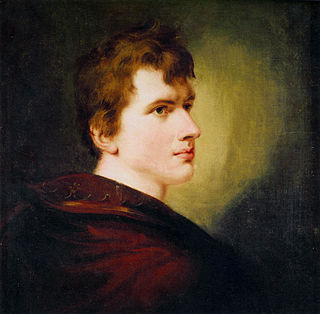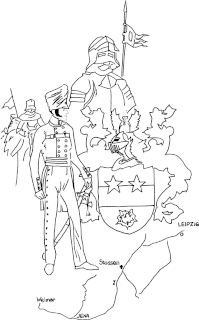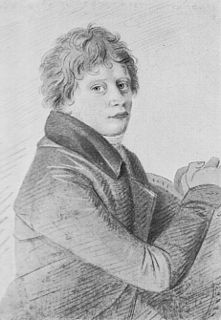
Georg Wilhelm Vogel (7 November 1743 – 16 December 1813 [1] ) was a German jurist and mayor in Jena.

Jena is a German university city and the second largest city in Thuringia. Together with the nearby cities of Erfurt and Weimar, it forms the central metropolitan area of Thuringia with approximately 500,000 inhabitants, while the city itself has a population of about 110,000. Jena is a centre of education and research; the Friedrich Schiller University was founded in 1558 and had 18,000 students in 2017 and the Ernst-Abbe-Fachhochschule Jena counts another 5,000 students. Furthermore, there are many institutes of the leading German research societies.
Contents
Born in Feuchtwangen, Vogel was later a clerk, court director, and councillor in Köstritz. In 1792 he moved to Jena, taking a position as treasurer (Kreiskassierer) for the local area. In August 1793 he became the Second Mayor (zweiter Bürgermeister) and in June 1805 First Mayor (erster Bürgermeister). At the time of the Battle of Jena–Auerstedt in 1806, Napoleon Bonaparte stayed in his house in the Jena Marktplatz. In July 1806, he was returned to being Second Mayor but from August 1807 until September 1808 was once again First Mayor, and remained a mayor until 1809. During his term in office, he continued to server as treasurer for the area. In 1801 he became a member of the Chamber Council (Kammerrat).

Feuchtwangen is a city in Ansbach district in the administrative region of Middle Franconia in Bavaria, Germany. In the year 2019 Feuchtwangen celebrated its 1200th jubilee based on the first mention of its Benedictine monastery.
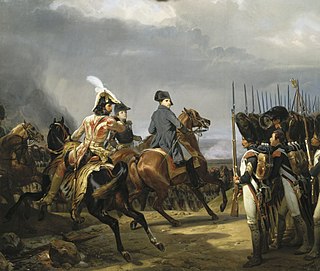
The twin battles of Jena and Auerstedt were fought on 14 October 1806 on the plateau west of the river Saale in today's Germany, between the forces of Napoleon I of France and Frederick William III of Prussia. The decisive defeat suffered by the Prussian Army subjugated the Kingdom of Prussia to the French Empire until the Sixth Coalition was formed in 1812.
He was only one of the mayors of the city at this time. A contemporary figure also serving as mayor, who was somewhat more important than Vogel with better diplomatic skills and connections, was the merchant and court representative of Saxony-Weimar, Johann Christoph Jacob Paulsen (1768-1808). He was mayor from 1789 to 1808 and exchanged the position of First and Second Mayor with Vogel several times. [2] Vogel was later criticized for the time as mayor in 1806 during the battle, being described as sickly, hesitant and indecisive. At that point, Paulsen was already incapacitated with illness.
Vogel was engaged in social issues in Jena and established a poorhouse, whose residents later received work through his son's cloth factory. He received heavy criticism for the heavy-handed manner in which he ran the poorhouse, but was still the only one then tackling this issue. When he retired from the city council and politics in 1810, in part because of conflicts with the city's police commissioner, he remained director of the hospital, workhouse and asylum. He died in 1813 in Jena.

A poorhouse or workhouse is a government-run facility to support and provide housing for the dependent or needy.

On 12 October 1808, for his service in the care of the wounded after the Battle of Jena, he was named to the Legion of Honour (at the same time as Johann Wolfgang von Goethe, Christoph Martin Wieland and Johann Christian Stark). [3]
The Legion of Honour is the highest French order of merit for military and civil merits, established in 1802 by Napoleon Bonaparte and retained by all later French governments and régimes.

Johann Wolfgang (von) Goethe was a German writer and statesman. His works include four novels; epic and lyric poetry; prose and verse dramas; memoirs; an autobiography; literary and aesthetic criticism; and treatises on botany, anatomy, and colour. In addition, there are numerous literary and scientific fragments, more than 10,000 letters, and nearly 3,000 drawings by him extant.
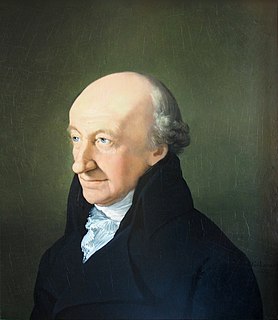
Christoph Martin Wieland was a German poet and writer. He is best-remembered for having written the first Bildungsroman, as well as the epic Oberon, which formed the basis for Carl Maria von Weber's opera of the same name. His thought was representative of the cosmopolitanism of the German Enlightenment, exemplified in his remark: "Only a true cosmopolitan can be a good citizen."
One of his brothers was Georg Johann Ludwig Vogel (1742–1776), a German orientalist and Protestant theologian.

Oriental studies is the academic field of study that embraces Near Eastern and Far Eastern societies and cultures, languages, peoples, history and archaeology; in recent years the subject has often been turned into the newer terms of Middle Eastern studies and Asian studies. Traditional Oriental studies in Europe is today generally focused on the discipline of Islamic studies, while the study of China, especially traditional China, is often called Sinology. The study of East Asia in general, especially in the United States, is often called East Asian studies, while the study of Israel and Jews are called Israel studies and Jewish studies respectively, although they are often considered the same field.



